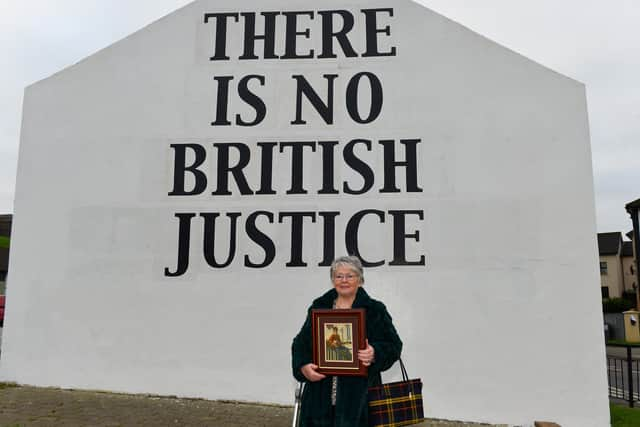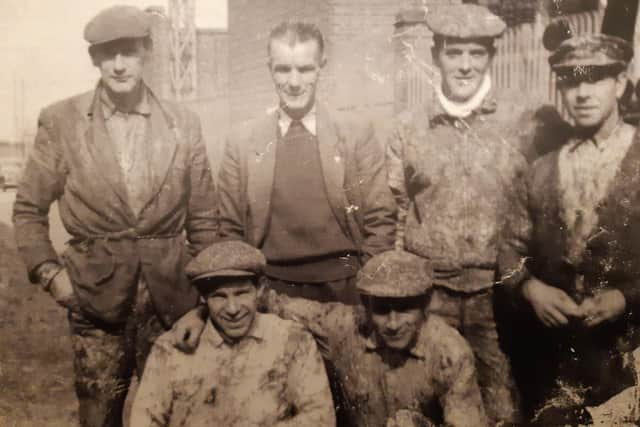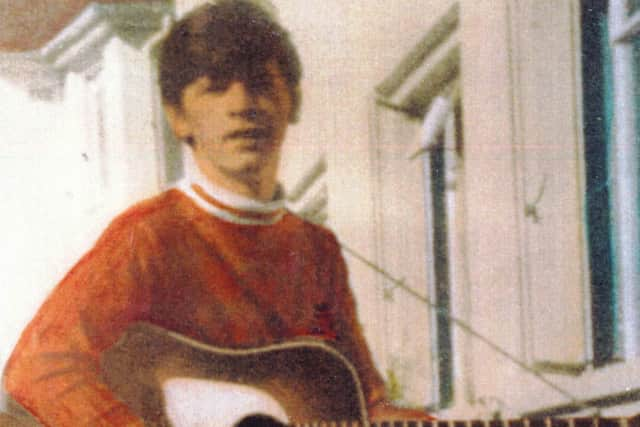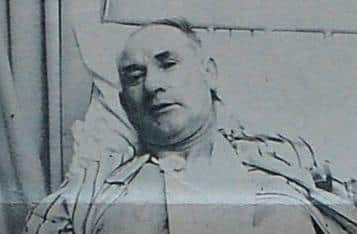Bloody Sunday 50: ‘My mother started screaming Willie, Willie, Willie...I’ll never forget that’
and live on Freeview channel 276
The country singer’s hit cowboy ballad ‘El Paso,’ was a particular favourite and brings back fond memories for William’s big sister Kate.
“He loved music. Country and Western. Every time I hear that song - sometimes you find yourself humming it, Marty Robbins, ‘El Paso’,” she says, breaking into song in reminiscence, “‘Out in the West Texas town of El Paso, I fell in love with a Mexican girl’.
Advertisement
Hide AdAdvertisement
Hide Ad“He used to play it every night. He loved that song. He just did a bit of strumming on the guitar but wasn’t really musical in that sense but he did love the music.”


By the time of Bloody Sunday when William, aged 19, was murdered by British paratroopers while participating in an anti-internment march in the Bogside he had left school and was working down the docks like his father Alex, who was quietly proud of him in the way of Derry men in those days.
“He was a hard worker. A very strong fellah. My father used to remark on his strength before he died. ‘You want to see Willie lifting the spuds in the docks’,” Kate recalls.
He did a bit of boxing at his local club, St. Mary’s ABC, as well. But he didn’t live to see his brother Charlie, the famous Derry lightweight, compete for Ireland at the Munich Olympics or to fight Jim Watt for the world title as a professional in 1980.
Advertisement
Hide AdAdvertisement
Hide Ad“He would have trained at boxing,” says Kate. “He was always down with Charlie. He didn’t have the same interest that Charlie had but he was there all the same.


“He used to say he was letting Charlie use him as a punch bag! He was a good fellah.”
This self-deprecating humour and sense of fun stands out for Kate looking back.
“He was so good humoured. Always full of jokes. Practical jokes. He would have set up something that would have scared the life out of you. A basin over the door type of a boy. Or a dummy coming down from the roof space. Anything for a laugh.”
Advertisement
Hide AdAdvertisement
Hide AdJust before Bloody Sunday William and Kate’s mother Bridie took a heart attack and was taken to hospital. Some of the family who were away travelled back to Ireland so that they could be at their mother’s hospital bedside.


“My last memory of Willie was him and I standing at the crack in the door. Our Alan had just come home from England because my mother had had a heart attack and he arrived with his girlfriend and Willie was a bit shy, so me and him were staring through the crack in the door. Just having a bit of crack,” says Kate.
On January 30, 1972, William joined tens of thousands in a major demonstration against internment in Derry - what would become known as Bloody Sunday, Britain’s shame, and one of the darkest days in Derry’s history.
Kate’s father Alex went off to Mass as was his habit of a Sunday morning. Kate heard nothing until late that afternoon. She was in her boyfriend’s house.


Advertisement
Hide AdAdvertisement
Hide Ad“Around 5 o’clock a knock came to my boyfriend’s door and the door opened and I could see the girl. She was a neighbour and a good friend.
“She said, ‘Your Willie has been shot dead and your father is wounded but he’s ok.’ That was it. My head went. Somehow I got home and my uncle Jimmy met me at Creggan. I didn’t even get into the house. He took us over to the hospital. We walked up all the floors. All the way up a lot of the doctors and nurses, they were all crying. They were really, really upset by it all.”
Kate didn’t know the horrific details at that point but William had been shot dead by members of the British Parachute Regiment at a rubble barricade in Rossville Street near the entrance to Glenfada Park. Her father was also shot and badly wounded while trying to go to the aid of his son.
Michael Kelly (aged 17), Hugh Gilmour (aged 17), John Young (aged 17), Michael McDaid (aged 20) and Kevin McElhinney (aged 17) were all shot dead at the same location.
Advertisement
Hide AdAdvertisement
Hide AdThirteen people in all had lost their lives while a fourteenth would die of fatal injuries months later.
In his report into the massacre which was published in 2010, Mark Saville said he was unable to say for certain who had shot William.


He stated: “We are sure that Corporal P of Mortar Platoon, who had disembarked from Sergeant O’s Armoured Personnel Carrier (APC) in Rossville Street, shot at least one of these casualties [William Nash, John Young and Michael McDaid] and may have been responsible for all three, though Lance Corporal J of Anti-Tank Platoon may have shot one of them and we cannot eliminate the possibility that Corporal E was responsible for another.
“Corporal P fired from a position in Rossville Street north of the rubble barricade and south of the low walls of the Kells Walk ramp; while Lance Corporal J and Corporal E fired from a position at that ramp.”
Advertisement
Hide AdAdvertisement
Hide AdAfter learning of the slaughter Kate was in state of shocked distraction. With her mother in hospital recuperating from her heart attack and her father being treated for the gunshot wounds inflicted by the British soldiers, Kate was left in charge of William’s wake at the family home in Dunree Gardens. She was 22.
“I remember walking down the town with my older brother Paddy. I was in charge of the house. They were all married and out of the house. He walked me down to Bradley and McLaughlin’s [the local funeral directors] and the town was so quiet you could have heard a pin drop. There was the most eerie feeling around the town. It was totally silent going there and coming back.
“We had very good neighbours. Roy McMonagle was a busman. He was a very nice man. Roy said to me, ‘Kate, look you just stand at the door and greet people and leave the wake to us’. Right enough I didn’t have to do a thing. They got the food and everything. Even lighting the fire. Very good people.”
Alex Nash was aged 52 on Bloody Sunday when he was shot as he ran to the rubble barricade to try to help his son and the other innocents - dead, dying or maimed.
Advertisement
Hide AdAdvertisement
Hide Ad“My father did the bravest thing anybody could do and a witness said it. She said he came out of there - people tried to hold him back when he spotted Willie’s body. He was going anyway. That would have been the kind of my father. He wasn’t a man who was afraid of anything. He really wasn’t.
“His only memories of it - and he felt horrible about it- was that he questioned why he let them take Willie’s body. They threw it into a ‘Saracen’ with the other bodies. He had been moving the bodies, witnesses said, trying to get them together, protecting them. But he got shot and thought the soldier was coming up to shoot him. He thought they were going to finish him off.”
William was buried after Requiem Mass in St. Mary’s Chapel in Creggan on the Wednesday but neither his mother nor his father could attend as they were still too ill in Altnagelvin.
“My father didn’t get to the funeral. It must have been terrible for them. He was still in the hospital. He was watching the funeral in the hospital and the RUC Special Branch were in questioning them and my father said, ‘Look son, will you go away and give me peace? I’m watching my son’s funeral.’
Advertisement
Hide AdAdvertisement
Hide Ad“My mother didn’t know. She wasn’t told until the Wednesday because they were a bit afraid. She was well sedated and they decided she had to know that he was being buried. They thought it wouldn’t have been a good thing for her to come out not knowing that, you know. My da was wheeled down to tell her. She was sedated. I don’t know if it had something to do with that but she never uttered a sound.”
But Kate will never forget the day her mother was discharged from the hospital and returned to the house in Dunree Gardens.
“She was still silent but when she put her foot over the step of the door, Jesus, the wails. She started to scream, ‘Willie, Willie, Willie’. You know that went on for a long time. That screaming. I’ll never forget that.”
Advertisement
Hide AdAdvertisement
Hide AdThe Nash house - like several other of the homes of the victims - was raided periodically by the British army in what many believe was a concerted strategy to try to blacken the names of the families and fit the false establishment narrative. All those lies about the guns and the nail bombs.
Soldiers used to taunt Bridie up until her death in 1979.
“The army helped to finish her off,” says Kate. “We were raided, you know. At the beginning it seemed like a weekly thing. Then it would have been every month or so. For seven years after it, in fact. That’s why we remarked on it. Until my mother died. Then they stopped after my mother died. Why did they stop when my mother died? They used to call to her ‘Bridie, are you going to make us a cup of tea’ and stuff like that. Jesus it used to drive her mad.”
Alex Nash had worked in the docks and often would have taken the older sons on the Heysham ferry over to England to go and work in Sutton Coldfield in the British midlands. But he was hardly fit for work after what happened to him.
Kate reflects: “He tried to work after it but he couldn’t. He couldn’t stay in the job down the docks after that.”
Advertisement
Hide AdAdvertisement
Hide AdUnderstandably he had been deeply affected by the atrocity.
“He suffered that day. He really did suffer...In later years when he talked more you realised more about his feelings because you could see then the post-traumatic stress in the last ten years of his life.
“He passed on January 25, 1999 just a few days before the Bloody Sunday anniversary. He had wanted to die anyway. He was fed up. He reckoned he should have never been there.”
Kate Nash has been an indefatigable campaigner for justice for the victims of Bloody Sunday for years.
Advertisement
Hide AdAdvertisement
Hide AdOn Sunday she will chair the Bloody Sunday March Committee 50th anniversary ‘There is no British justice’ rally at Free Derry corner at which Eamonn McCann, Bernadette McAliskey and Clare Daly will be the speakers.
“I’ve often said - because people know I’m getting older - it is to the death,” she says. “I don’t know what will happen after that but I will keep campaigning until the death.”
She often wonders at what was going through the collective mind of the British establishment, not just at the time of Bloody Sunday, but long afterwards.
“Imagine 50 years now and still fighting. What I’m left asking now is, why? Why did they kill those people? Why was there all that collusion and them sending undercover agents over here acting as terrorists or IRA or whatever? And coming over and shooting people? Why were they doing that?
Advertisement
Hide AdAdvertisement
Hide Ad“The only reason could be that they were perpetuating that war because it really should have ended long before it did. Lots of people died. It should never have happened. Why would they perpetuate a war against us?”
Sunday will be an opportunity for Kate and her family to remember their parents Alex and Bridie and their lost brother Willie.
“He would have got through life grand. His wife wouldn’t have wanted because he liked working. His wife would have never wanted. He would have had a family.
“Would he have been a grandfather now? Maybe a great-grandfather? I will always miss Willie. He was at that age when he was dreaming about travelling and he never got a chance, you know.”
